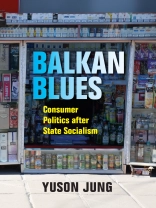Balkan Blues explores how a state transitions from the collectivized production and distribution of socialism to the consumer-focused culture of capitalism. Yuson Jung considers the state as an economic agent in upholding rights and responsibilities in the shift to a global market. Taking Bulgaria as her focus, Jung shows how impoverished Bulgarians developed a consumer-oriented society and how the concept of ‘need’ adapted in surprising ways to accommodate this new culture.
Different legal frameworks arose to ensure the rights of vulnerable or deceived consumers. Consumer advocacy NGOs and government officers scrambled to navigate unfamiliar EU-imposed models for consumer affairs departments. All of these changes involved issues of responsibility, accountability, and civic engagement, which brought Bulgarians new ways of viewing both their identities and their sense of agency. Yet these opportunities also raised questions of inequality, injustice, and social stratification. Jung’s study provides a compelling argument for reconsidering of the role of the state in the construction of 21st-century consumer cultures.
Inhoudsopgave
Acknowledgements
Note on Transliteration and Translation
Introduction
1. Mente: Consumer Grievances
2. ‘Needs, ‘ Rights, and Protection
3. Consumer Activism?
4. Consumption as Civic Engagement
5. Consumer Politics after State Socialism
Epilogue: ‘Enough is Enough.’—The Moral Commitment of the State
Appendix. Notes on Fieldwork: An East Asian Ethnographer in Eastern Europe
Bibliography
Index
Over de auteur
Yuson Jung is Associate Professor of Anthropology at Wayne State University. She is editor with Jakob Klein and Melissa Caldwell of Ethical Eating in the Postsocialist and Socialist World.












